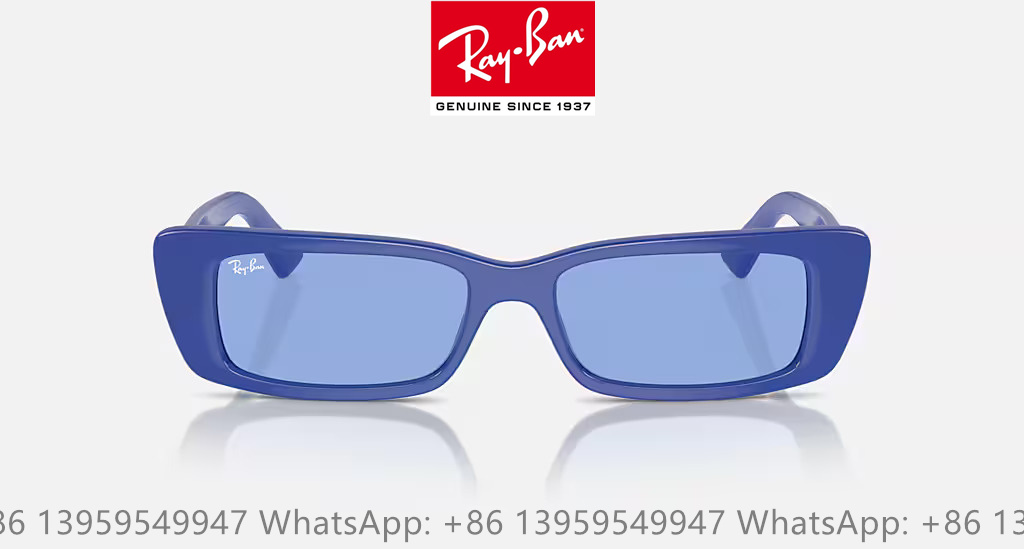In recent years, environmental awareness has become increasingly prevalent around the world, and people have begun to pay attention to the importance of sustainable development and environmentally friendly products. Against this background, knockoff Ray Ban sunglasses has launched the new Teru Bio-Based series of sunglasses, which combines fashionable design with eco-friendly material selection and has become a popular choice for consumers. Teru is a genderless rectangular shape made with bio-based nylon frames and lenses. This new Ray Ban shape is available in four colorful combinations.
Unisex rectangular glasses
Knockoff Ray Ban sunglasses has launched a new series of Teru Bio-Based sunglasses, and its fashionable design has attracted widespread attention. The design incorporates modern concepts. With a neutral design as the main feature, this rectangular pair of glasses designed to adapt to various face shapes. It is simple and stylish, exuding unadorned charm.
From the appearance point of view, the rectangular glasses of the Teru Bio-Based series adopt a classic right-angle design, highlighting the essence of geometric aesthetics, and they look particularly decent whether worn by men or women. The width and height ratio of the lenses are just right, which can protect the eyes from the strong sun while maintaining a sense of fashion. The dark lens selection further highlights the mature temperament of this pair of sunglasses, allowing the wearer to stay refreshed and confident even in the hot summer.
Knockoff Ray Ban sunglasses of Teru Bio-Based are available in four main color combinations, allowing consumers to choose according to personal preferences and style needs. Each color has carefully designed to retain the classic elements of Ray Ban while keeping pace with the times, in line with today’s young people’s pursuit of diversity and personalization.
Knockoff Ray Ban sunglasses of Teru Bio-Based rectangular glasses have become a popular choice in the current market with their fashionable design. It is not only a fashionable accessory, but also a positive practice of the concept of sustainable development, providing consumers with a choice that is both beautiful and environmentally friendly.
Environmental performance
As people’s awareness of environmental protection increases, more and more consumers are beginning to pay attention to the materials and environmental performance of products. In the eyewear industry, knockoff Ray Ban Teru Bio-Based sunglasses have attracted much attention for their unique material selection and excellent environmental performance.
The material selection of knockoff Ray Ban Teru Bio-Based sunglasses is one of its eye-catching features. Compared with traditional plastic frames, the Teru series is made of bio-based materials, which are usually derived from renewable resources such as plant biomass or bio-based plastics. This innovative choice not only coexists with fashion in appearance, but also greatly reduces the dependence on traditional petroleum-based plastics, thereby reducing the pressure on limited resources.
In addition to material selection, knockoff Ray Ban Teru Bio-Based sunglasses also have significant advantages in environmental performance. Bio-based materials generally have a lower carbon footprint because they produce less greenhouse gas emissions during the production process. This material is also able to degrade more quickly, reducing the long-term impact on the environment. Therefore, choosing bio-based materials to make Teru sunglasses not only helps reduce plastic pollution, but also helps protect the health of the ecosystem.
Knockoff Ray Ban sunglasses of Teru Bio-Based are not only a fashionable eyewear product, but also a manifestation of an environmental protection concept. By adopting bio-based materials, it has made a positive contribution to reducing plastic pollution and protecting environmental resources. As consumers’ environmental awareness increases, people believe that they will widely recognize and apply such innovative products in the future.
Social Responsibility
Made of unique bio-based materials, knockoff Ray Ban Teru Bio-Based Sunglasses not only have all the functions of traditional sunglasses, but also pay attention to ecological and environmental protection in material selection. The bio-based plastics it uses not only reduce dependence on traditional oil resources, but also greatly reduce carbon emissions in the manufacturing process. This innovation not only brings more environmentally friendly products, but also promotes the industry’s transformation to sustainable development.
Through its practical actions of environmental protection and social responsibility, knockoff Ray Ban Teru Bio-Based Sunglasses has not only established a good corporate image, but also won the recognition and support of consumers. In the context of today’s consumers paying more and more attention to the values and behaviors behind the brand, this active social responsibility strategy has not only won market share for the brand, but also established a long-term good reputation for it.

With the further popularization of environmental awareness and the increase in consumer demand for sustainable products, imitation raybans will continue to be committed to innovation and sustainable development. In the future, they will continue to improve the environmental performance of their products, explore more sustainable materials and manufacturing processes to further reduce the impact on the environment, and show more positive impact in the field of social responsibility.
Knockoff Ray Ban Teru Bio-Based Sunglasses, through its unique environmentally friendly eyewear products and active social responsibility practices, demonstrates how a modern enterprise can take on the responsibility of environmental protection and social development while achieving commercial success. It is not only an innovative leader in the eyewear industry, but also a practitioner and leader of the concept of sustainable development, setting an example for global companies to learn from.
